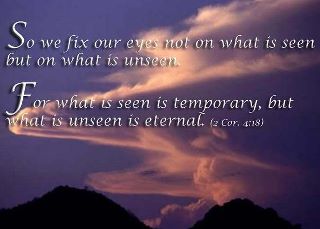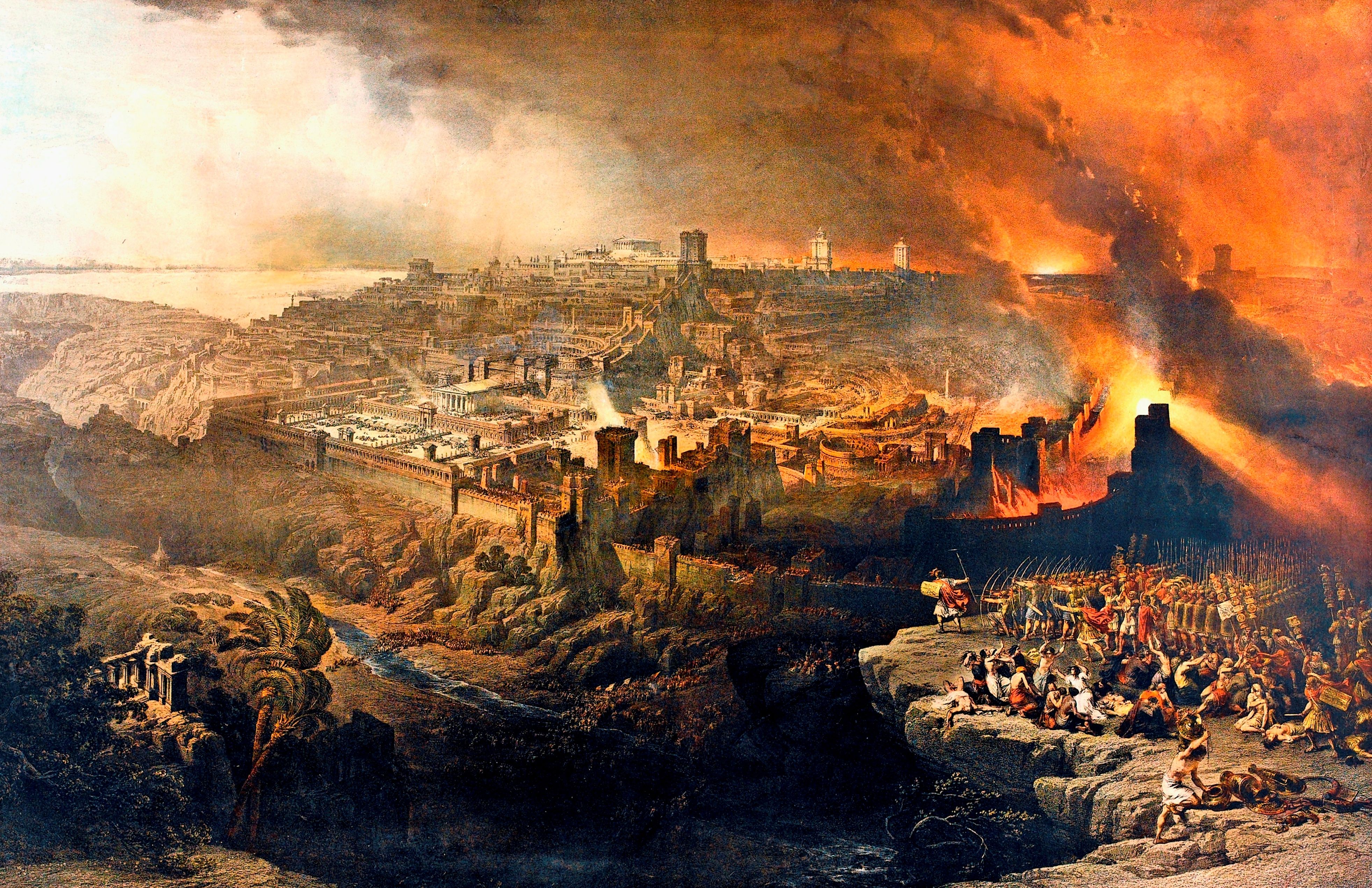People join themselves to different denominations and churches for many different reasons. But is this a manifestation of what it means to be one IN Christ? Is Christ divided? No! He is one with the Father and with all those who are in His body, members of one another without man-made walls and divisions.
For the love of Christ constrains us; because we thus judge, that if one died for all, then were all dead: And that he died for all, that they who live should no longer live unto themselves, but unto him who died for them, and rose again. Therefore from now on know we no man after the flesh: yea, though we have known Christ after the flesh, yet from now on know we him no more. Therefore if any man be in Christ, he is a new creation: old things are passed away; behold, all things are become new. (2Cor 5:14-17, KJ2000)
The Word of God, Jesus Christ, by His Spirit is active in those who are His to separate the grip of our souls that seek to have preeminence over our spirits.
For the WORD of God is living, and powerful, and sharper than any two-edged sword, piercing even to the dividing asunder of soul and spirit, and of the joints and marrow, and is a discerner of the thoughts and intents of the heart. Neither is there any creature that is not manifest in HIS sight: but all things are naked and opened unto the eyes of HIM with whom we have to do. (Heb 4:12-13, KJ2000)
Many contribute the above passage to the power of Bible reading, but the Bible alone can not accomplish all that this passage is speaking of. Only the living Word of God can. Many Christians in the world are still living according to their own fleshly, soulish wills, intellects and emotions (their souls). There is no division of soul and spirit in them. Their old man has not passed away. The true believer has been crucified with Christ and risen again in newness of life, the Life of Christ. The problem arises after our spirit has been made alive IN Christ and our old soulish nature does not want to play second fiddle to Him. Paul wrote about this in the book of Romans.
For I know that in me (that is, in my flesh,) dwells no good thing: for to will is present with me; but how to perform that which is good I find not. For the good that I would I do not: but the evil which I would not, that I do. Now if I do that which I would not, it is no more I that does it, but sin that dwells in me. I find then a law, that, when I would do good, evil is present with me. For I delight in the law of God after the inward man: But I see another law in my members, warring against the law of my mind, and bringing me into captivity to the law of sin which is in my members. O wretched man that I am! who shall deliver me from the body of this death? I thank God through Jesus Christ our Lord. So then with the mind I myself serve the law of God; but with the flesh the law of sin. (Rom 7:18-25, KJ2000)
Paul went on to write about the solution to this dilemma.
There is therefore now no condemnation to them who are in Christ Jesus, who walk not after the flesh, but after the Spirit. For the law of the Spirit of life in Christ Jesus has made me free from the law of sin and death… For they that are after the flesh do mind the things of the flesh; but they that are after the Spirit the things of the Spirit. For to be carnally minded is death; but to be spiritually minded is life and peace. Because the carnal mind is enmity against God: for it is not subject to the law of God, neither indeed can be. So then they that are in the flesh cannot please God. But you are not in the flesh, but in the Spirit, if so be that the Spirit of God dwells in you. Now if any man have not the Spirit of Christ, he is none of his. (Rom 8:1-9, KJ2000)
The problem in Christendom is not being members of the right church organization. The problem is that many Christians today are not experiencing first-hand the Life of Christ within because they have yet to be filled with His Spirit. If we don’t have the Spirit of Christ within, we are not His nor are we yet members of His body, obeying Him as our Head.
Once we are alive IN Christ we see all of mankind differently than we did before. Like the blind man said after Jesus prayed for him a second time, “Now I see all men clearly” instead of seeing them like he did at first–as “trees walking.” We are given spiritual sight when we are made alive by the indwelling of the Holy Spirit. It is in this state that we cease to know men and women after the flesh, but see them as the Spirit of God sees them.
But after faith is come… you are all the children of God by faith in Christ Jesus. For as many of you as have been baptized into Christ have put on Christ. There is neither Jew nor Greek, there is neither bond nor free, there is neither male nor female: for you are all one in Christ Jesus. (Gal 3:25-28, KJ2000 – emphasis added)
What is faith? When I was a young Catholic I was told that because I was baptized by a priest I was now a member of “the Faith.” Faith is not a man-made institution, nor is it a mere mindset that we conjure up by “positive thinking.” Faith is a divine gift that comes into us from the Father that enables us to draw near to Him in a loving relationship and see things the way He does. It is here that He floods us with His love. In Him we see everyone and everything as Jesus does.
Now faith is the substance of things hoped for, the evidence of things not seen. (Heb 11:1, KJ2000)
Having therefore, brethren, boldness to enter into the holiest by the blood of Jesus, By a new and living way, which he has consecrated for us, through the veil, that is to say, his flesh; And having a high priest over the house of God; Let us draw near with a true heart in full assurance of faith, having our hearts sprinkled from an evil conscience, and our bodies washed with pure water. (Heb 10:19-22, KJ2000)
For by grace are you saved through faith; and that not of yourselves: it is the gift of God: Not of works, lest any man should boast. (Eph 2:8-9, KJ2000)
Faith is a miracle. With hearts filled with His faith, we can boldly enter into His presence as His children. Here we can pray according to His will and know that He hears us and will answer.
In Jesus’ final prayer on earth we read:
Neither pray I for these alone, but for them also who shall believe on me through their word; That they all may be one; as you, Father, are in me, and I in you, that they also may be one in us: that the world may believe that you have sent me. (John 17:20-21, KJ2000)
It is here in divine oneness with the Father and the Son that we have our testimony before the world as Christ’s living body, directed by Him as our Head. Of the newly born-from-above church of the first century the Spirit in them made all the difference and their witness had power, “…These that have turned the world upside down are come here also.”(Acts 17:6, KJ2000)
The True Church of Christ Is a Living Organism
But [we] speaking the truth in love, may grow up into him in all things, who is the head, even Christ: From whom the whole body being fitly joined together and knit together by that which every joint supplies, according to the effectual working in the measure of every part, makes increase of the body unto the edifying of itself in love. (Eph 4:15-16, KJ2000)
It is by being joined together in His Spirit as a living organism that we find the supply of Christ, just as any member of our mortal bodies gets its supply. If you cut off a member of your own body it dies and can no longer function neither does the rest of your body function as it once did. We need every member of His body to function in the fullness of Christ (see 1 Corinthians 12:12-19). The effective working of the measure of every part makes for the growth of His body. Satan seeks to divide us and destroy Christ’s body and negate its witness to a dying world. Jesus said, “The thief comes not, but to steal, and to kill, and to destroy: I am come that they might have life, and that they might have it more abundantly.” (John 10:10, KJ2000)
Bind Us Together, Lord
Bind Us Together
With Cords That Cannot Be Broken
Bind Us Together, Lord
Bind Us Together
Bind Us Together In LoveThere Is Only One God,
There Is Only One King
There Is Only One Body,
That Is Why We Sing.Bind Us Together, Lord
Bind Us Together
With Cords That Cannot Be Broken
Bind Us Together, Lord
Bind Us Together
Bind Us Together In LoveMade For The Glory Of God,
Purchased By His Precious Son;
Born With The Right To Be Clean,
For Jesus The Victory Has Won.Bind Us Together, Lord
Bind Us Together
With Cords That Cannot Be Broken
Bind Us Together, Lord
Bind Us Together
Bind Us Together In LoveYou Are The Family Of God,
You Are The Promise Divine;
You Are God’s Chosen Desire,
You Are The Glorious New Wine.Bind Us Together, Lord
Bind Us Together
With Cords That Cannot Be Broken
Bind Us Together, Lord
Bind Us Together
Bind Us Together In LoveHymn written by Bob Gillman












